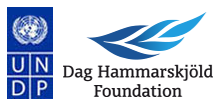Giving the 2014 Dag Hammarskjöld Lecture, Helen Clark, Administrator of the UN Development Programme (UNDP), reflected on the Millennium Development Goals (MDGs), and discussed consultations and negotiations on the post-2015 development agenda and the Sustainable Development Goals (SDGs).
 4 November 2014: Giving the 2014 Dag Hammarskjöld Lecture, Helen Clark, Administrator of the UN Development Programme (UNDP), reflected on the Millennium Development Goals (MDGs) and discussed consultations and negotiations on the post-2015 development agenda and the Sustainable Development Goals (SDGs). Clark spoke at the Dag Hammarskjöld Foundation in Uppsala, Sweden, on 4 November 2014.
4 November 2014: Giving the 2014 Dag Hammarskjöld Lecture, Helen Clark, Administrator of the UN Development Programme (UNDP), reflected on the Millennium Development Goals (MDGs) and discussed consultations and negotiations on the post-2015 development agenda and the Sustainable Development Goals (SDGs). Clark spoke at the Dag Hammarskjöld Foundation in Uppsala, Sweden, on 4 November 2014.
In the lecture, titled ‘The Future We Want-Can We Make it a Reality?,’ Clark outlined reasons for a “glass more than half full view of the MDGs,” including the predicted recovery of the ozone layer to relatively healthy layers by 2050; decreased levels of extreme poverty; decreased levels of infant and child mortality; achievement of gender parity in education, on average; and increased access to improved drinking water. Clark also noted obstacles to achieving the MDGs, such as conflicts and war, rising income inequality, environmental degradation and climate change threats, gender inequality and infectious diseases.
On the post-2015 agenda, Clark described as “very significant” the inclusion of proposed SDG 16 on promoting peace and inclusive societies, providing access to justice for all, and building effective, accountable and inclusive institutions. She said Goal 16 is one of the more controversial goals, noting concerns over how to measure progress toward such a goal and how to translate universal targets and indicators at the national level. She reported that pilot projects are underway in Albania, Indonesia, Rwanda and Tunisia, and that their results are showing that governance can be operationalized in non-controversial ways at national and sub-national levels. Clark stressed that success on proposed Goal 16 could drive progress on all other goals.
The UN Development Group (UNDG) is supporting a second round of consultations on “softer” means of implementation (MOI), according to Clark. She highlighted six focus areas: the role of local government, including urban governance; institutional capacities; participatory monitoring and accountability; full, active and meaningful participation of civil society; the role of the private sector; and culture and heritage as a driver of economic opportunity and a source of values. Clark said efforts to strengthen institutional capacities must go beyond improving effectiveness and efficiency, to making institutions open and responsive to stakeholders on policy design, implementation and monitoring.
Clark also highlighted the central role of the UN in driving the post-2015 development agenda, including ensuring that the UN is ‘fit for purpose.’ [Speech of UNDP Administrator] [Dag Hammarskjöld Lecture Webpage]